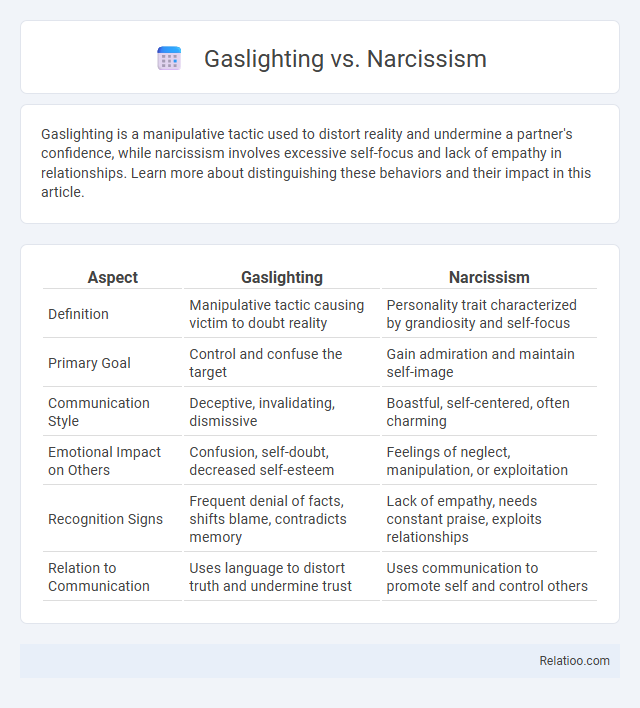Gaslighting is a manipulative tactic used to distort reality and undermine a partner's confidence, while narcissism involves excessive self-focus and lack of empathy in relationships. Learn more about distinguishing these behaviors and their impact in this article.
Table of Comparison
| Aspect | Gaslighting | Narcissism |
|---|---|---|
| Definition | Manipulative tactic causing victim to doubt reality | Personality trait characterized by grandiosity and self-focus |
| Primary Goal | Control and confuse the target | Gain admiration and maintain self-image |
| Communication Style | Deceptive, invalidating, dismissive | Boastful, self-centered, often charming |
| Emotional Impact on Others | Confusion, self-doubt, decreased self-esteem | Feelings of neglect, manipulation, or exploitation |
| Recognition Signs | Frequent denial of facts, shifts blame, contradicts memory | Lack of empathy, needs constant praise, exploits relationships |
| Relation to Communication | Uses language to distort truth and undermine trust | Uses communication to promote self and control others |
Understanding Gaslighting: Definition and Key Traits
Gaslighting is a manipulative tactic where someone intentionally distorts reality to make you doubt your perceptions and memory. Key traits include persistent lying, denial of facts, and emotional manipulation, often causing victims to question their sanity. Recognizing these behaviors is crucial for distinguishing gaslighting from narcissism, which primarily centers on grandiosity and self-importance rather than direct psychological control.
What is Narcissism? Core Characteristics Explained
Narcissism is a personality trait characterized by an inflated sense of self-importance, a deep need for excessive attention and admiration, and a lack of empathy for others. Core characteristics include grandiosity, entitlement, manipulativeness, and a tendency to exploit interpersonal relationships for personal gain. Unlike gaslighting, which is a manipulative tactic designed to make someone doubt their reality, narcissism is a broader personality pattern that can include gaslighting as a behavior.
Gaslighting vs Narcissism: Main Differences
Gaslighting is a psychological manipulation tactic used to make someone doubt their reality, while narcissism is a personality disorder characterized by an inflated sense of self-importance and lack of empathy. Gaslighting primarily aims to control and confuse the victim, whereas narcissism drives behavior centered on seeking admiration and validation. Understanding these distinctions helps you identify whether manipulative behavior stems from intent to deceive or from narcissistic traits.
Psychological Tactics: Manipulation in Gaslighting and Narcissism
Gaslighting involves psychological manipulation that makes victims doubt their reality, often using denial and distortion of facts to maintain control. Narcissism includes manipulative tactics such as exploitative behavior, lack of empathy, and grandiosity to dominate others and preserve self-image. While gaslighting specifically targets perception to destabilize, narcissistic manipulation emphasizes self-importance and emotional exploitation for personal gain.
Identifying Gaslighting in Relationships
Gaslighting in relationships involves manipulative tactics that make You doubt your reality, while narcissism centers on an inflated sense of self-importance and a lack of empathy. Identifying gaslighting includes recognizing persistent lying, denying past events, and making You feel confused or insecure. Understanding these distinct behaviors is crucial for protecting Your emotional well-being and establishing healthy boundaries.
How Narcissists Exert Control
Narcissists exert control through gaslighting by manipulating your perception of reality, causing self-doubt and confusion to maintain dominance. This psychological abuse involves constant denial, misdirection, and contradiction to destabilize your confidence and foster dependence. Understanding the interplay between narcissism and gaslighting is crucial for recognizing and resisting these controlling tactics.
The Overlap: Are All Gaslighters Narcissists?
Gaslighting and narcissism often intersect, but not all gaslighters are narcissists, as gaslighting refers specifically to psychological manipulation causing victims to doubt their reality, while narcissism encompasses a broader pattern of grandiosity, entitlement, and empathy deficits. Most narcissists employ gaslighting tactics to maintain control and manipulate their victims, reinforcing the power imbalance in interpersonal relationships. Understanding this overlap is crucial for accurately identifying abusive behavior and tailoring effective psychological interventions to address both manipulative patterns and underlying narcissistic traits.
Warning Signs: Recognizing Gaslighting and Narcissistic Abuse
Recognizing gaslighting and narcissistic abuse involves identifying warning signs such as persistent manipulation, denial of reality, and undermining your confidence. Narcissistic abuse often includes a pattern of controlling behaviors, lack of empathy, and exploitative tendencies aimed at maintaining power over you. Awareness of these signs is crucial for protecting your mental health and establishing boundaries in toxic relationships.
Effects on Victims: Emotional and Mental Health Impact
Gaslighting erodes victims' sense of reality, causing confusion, anxiety, and self-doubt that can lead to depression and PTSD. Narcissistic abuse inflicts chronic emotional harm through manipulation and lack of empathy, fostering low self-esteem and emotional exhaustion. The intersection of gaslighting and narcissism intensifies trauma, severely impacting victims' mental health and prolonging recovery.
Steps to Cope: Healing from Gaslighting and Narcissistic Abuse
Healing from gaslighting and narcissistic abuse requires recognizing manipulative patterns and reclaiming your sense of reality by trusting your own perceptions. Establish clear boundaries, seek professional therapy, and build a strong support network to reinforce your emotional resilience. Prioritizing self-care and educating yourself about these toxic behaviors empowers your recovery and long-term mental wellness.

Infographic: Gaslighting vs Narcissism
 relatioo.com
relatioo.com